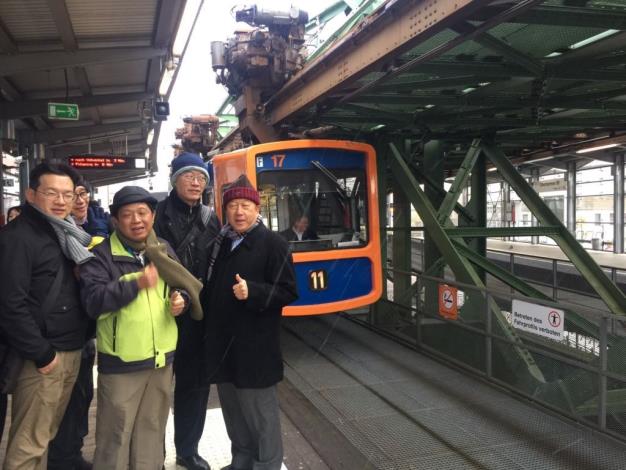 Hsinchu County Magistrate Chiu Ching-chun led a delegation to Wuppertal, a city in North Rhine-Westphalia, Germany to see its public transit system. Due to its steep slopes and limited space, a suspension railway system was built in 1901. Now it can carry about 85,000 passengers each year. Despite little change in the outward appearances, the one-hundred-year-old Wuppertal Suspension Railway has gone through 15 equipment upgrades and boasted cutting-edge structural designs. It not only becomes a historic construction but brings in considerable tourist revenues. Magistrate Chiu thought that Wuppertal could set a role model for Hsinchu County, where a national tourist railway system could also be built.
Hsinchu County Magistrate Chiu Ching-chun led a delegation to Wuppertal, a city in North Rhine-Westphalia, Germany to see its public transit system. Due to its steep slopes and limited space, a suspension railway system was built in 1901. Now it can carry about 85,000 passengers each year. Despite little change in the outward appearances, the one-hundred-year-old Wuppertal Suspension Railway has gone through 15 equipment upgrades and boasted cutting-edge structural designs. It not only becomes a historic construction but brings in considerable tourist revenues. Magistrate Chiu thought that Wuppertal could set a role model for Hsinchu County, where a national tourist railway system could also be built.
Wuppertal Suspension Railway is the only suspension railway system in Germany. The 13-kilometer railway attracts 90,000 visitors annually, which is equal to one-fourth of Wuppertal’s population. In 1901, power plants were built along with the railway system to ensure stable electricity supply. These were all pioneering eco-friendly constructions at that time. Director of Taipei Economic and Cultural Representative Office in Frankfurt am Main, Germany, Chen Chih-chung emphasized that the use of renewable energy has been widely discussed in Germany. Issues like abolition of thermal power plants can also be seen in Wuppertal. In spite of the disadvantageous environment, people in Wuppertal have benefited from tourism with the railway system that is well integrated with the landscape of the city. It would provide Hsinchu County with great reference value.
In addition, Magistrate Chiu also visited Philips Museum in the Netherlands. Head of Global Public & Government Affairs, Philips Lighting, Harry Verhaar revealed that the smart, connected LED lighting system designed by Philips can reduce energy consumption by 50%. Besides, the lighting technology can brighten our environment, which decreases criminal rate by 30%. It can also be used for traffic signals and street lights, which reduces traffic accidents by 30%. The lighting technology offers three benefits: reduced energy consumption, reduced cost and reduced carbon dioxide emission, giving people a better life quality.
Magistrate Chiu indicated that Philips is one of the biggest electronics companies in the world. It is well-known for its electronic appliances, communication equipment, computers and display systems. Philips used to set up factories in Hsinchu County’s Taihe Industrial Park; now it has plants in Hsinchu Science Park. In terms of televisions, lighting systems and monitors, Philips is at the leading edge. Through lighting technology, Philips has changed people’s life styles. The smart LED is an effective solution to the energy crisis, crimes and traffic problems.